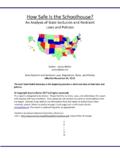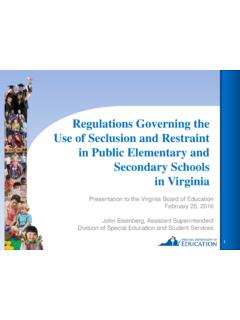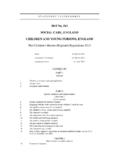Transcription of General Memo to all Foster Parents 1/2015 …
1 General Memo to all Foster Parents 1/2015 Reimbursement: A check (also referred to as board payment) is issued every month while the child is placed in your home. The board rate is based on a daily stipend rate designed to help cover costs associated with the child s need for food, shelter, clothing, school supplies and daily living expenses. Board checks are usually sent out during the first two (2) weeks of the month (with the exception of January when they are mailed mid-month). Depending on when the child was placed, you may not receive a check until the following month. Regular Care: Age 0 13; $ Age 14 18; $ When children go for extended visits for reunification, detention home, hospitalization, or adoption pre-placement, the board bill will often be adjusted, depending on the length of time and circumstances. Your support worker will discuss the specifics of your situation so you will better understand the reimbursement payment.
2 Initial Clothing Order: Initial clothing orders may be given at the time of the initial placement. The amounts will be based on the need of the child. Afterwards, Foster parent will use their reimbursement payment to purchase clothing. Exceptions should be discussed with your FBC support worker. Medical, Dental, Counseling and Therapy Needs: These services are covered by either a medical card through the County Department of Jobs & Family Services, private insurance, or billing the agency directly. When using medical/therapeutic services, make sure you take the proper information ( the child s Medicaid card or child s insurance card) and present it at the time you receive services. Should you be billed for any medical expense for a Foster child, please contact the Fiscal Department and report the issue. Foster Parents do not pay for medical costs. There are medical forms that need to be completed for every medical, dental and vision appointment.
3 (1) The initial two-day medical done at the caregiver s home is completed by the health department nurse and returned to LCCS. (2) There is a medical form (HealthChek Comprehensive Medical Exam) to be completed for the 60-day medical and annual medical. If you need a copy of these forms, please contact your support worker or go to our website and print one out. Once the doctor fills out the form, please have the doctor s office mail a copy back to the Agency, or you may send a copy to the Agency. (3) Any other contact with medical providers is to be documented on the Ongoing Place Child Healthcare form, with a copy to be sent back to the child s caseworker. Family Based Care Support: Support services are offered to each licensed family in an effort to help them with any issues related to placement with and/or separation from children within their care as well as to answer questions and address concerns.
4 Each family, upon licensure, is assigned to a worker from the Family Based Care Department, who is available to offer support and guidance and who will make regular contact with the Foster family. In addition, they will take care of any changes in your home, etc. Make sure you remain in compliance with all rules. Respite: Respite care services are designed to offer relief for Foster Parents from their Foster children ages three and older. Respite is not a babysitting service; it is there to assist families and to give the caregiver a break. Respites should be planned; however, if an emergency arises, then a respite may be arranged. Foster families are allowed up to three days of respite per month; however, if additional days are needed, please discuss the need with your support worker who will seek approval. Remember, respites are not intended for the actual holiday day, as Foster children are expected to celebrate holidays with Foster Parents .
5 Also, keep in mind that respite requests may not be able to be accommodated if made less than five days in advance. Respite requests should be made by contacting Caroline McKinney at 440-329-5594 or or the FBC coverage person in her absence. Day Care/Babysitting: Foster Parents are responsible to arrange appropriate day care or babysitting services for the children placed in their care. Payment for babysitting is the responsibility of the Foster family. When all licensed Foster caregivers in the home are working or going to school full-time, employment related daycare can be handled two ways: (1) a Foster family who is working, can arrange day care with an approved ODJFS individual provider or approved facility and not pay for the cost; or (2) if a Foster family chooses a non-licensed ODJFS provider or a non-approved facility, the payment of services is the responsibility of the Foster parent via their reimbursement board check.
6 A list of approved ODJFS Day Care providers can be obtained on the following website: Lorain County Children Services will cover the cost of daycare only. Any additional expenses incurred (field trips, transportation, etc.) are at the expense of the Foster parent. Home Alone: Children in Foster care may not be left home alone unless approved by the agency caseworker, along with a written plan. The agency will only consider a request for children age 14-18 years old and will need to take into consideration many factors, so please discuss this matter in advance with both your child s worker and your support worker. This will be handled on a case-by-case basis. Independent Living Services: IL services are provided to those children 15 and older. All children in LCCS custody must go through an IL assessment. Additional IL services include such services as on-going groups and case management.
7 Ancillary Casework Services: LCCS has the ability to arrange assessments and counseling services for children in the custody of the agency. Should your Foster child need counseling services, please discuss the individual needs of the child and arrangements for acquiring these services with the child s social worker. Please discuss with your Direct Services worker your concern. Foster families and their biological children are also welcome to use these services at no extra cost to the Foster parent. Purchase Orders: Clothing purchase orders can be used at the following in-county stores: Kmart, Sears, Target, Toys R Us, WalMart, Kohl s (Amherst), Wright, and JC Penney (See Catalog Department first). Make sure you check in with Customer Service first as sometimes they will have special instructions for you. Prescriptions: All kids will have a medical card available for the purchase of needed prescriptions.
8 Prescriptions can be obtained by using one of the following stores: CVS (Cleveland Street, Elyria location only), Drug Mart, Marc s Pharmacy, Rite Aid, and Walgreens. (Note: If for some reason the pharmacy doesn t honor the medical card or if you haven t received one, please pay for the prescription and turn in your receipt immediately to your support worker or the Fiscal Department for reimbursement. Confidentiality: Foster Parents are responsible to hold confidential child specific and family related information at all times. Foster Parents are also mandated reporters and must report suspected cases of abuse. SAFETY Car Seats/Airbags: Children 12 and younger may not be placed in the front seat of a car which has passenger seat airbags. No child in a car seat may be placed in the front seat. See attached car seat information. Baby Walkers: NO baby walkers with wheels are allowed to be used with Foster children.)
9 Bunk Beds: All bunk beds must have safety rails on the upper tier for a child under age 10 or for any child whose physical, mental or emotional conditions indicates the need for such protection. A bunk bed can only be two tiers and a child under age 6 can not sleep on the upper bunk. Helmets: Children should wear helmets when riding a bicycle, motorcycle, or all-terrain vehicle (ATV). Safety is everyone s job! Driver s Licenses: To ensure the safety of the children you drive, Foster Parents must have good driving records. To become licensed, we will run all driver s license information through the BMV to verify a valid driver s license and to check your driving record. Foster Parents with 4 points or less are considered to good standing; 6 points will require the Foster parent to reduce the point to 4, in order to continue, or once licensed, to be considered for placement and to be allowed driving privileges for our children.
10 We will discuss with each applicant their driving record and any concerns should they arise. Yearly driving records checks will be done on all drivers in the household. DUIs and DWIs are not acceptable to the Agency. Notification: Foster Parents must notify the Agency for several reasons. Please refer to attached information guide so you will be in compliance. Prescribed Medication Storage: To insure the safety of all children in your home, Foster Parents must store all prescriptions (with exception of an inhaler) in either a lockbox, a safe with a lock (wall or portable), a file cabinet with a lock, or a cabinet with a lock. The location of the key or the combination to the safe will be noted on the Environmental Checklist. Whichever container is approved, it is imperative to keep in mind the age and function of the child when storing the box or other in a safe/secure area of your home.




